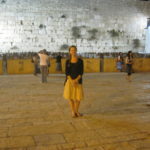An Outsider in Riyadh, Saudi Arabia
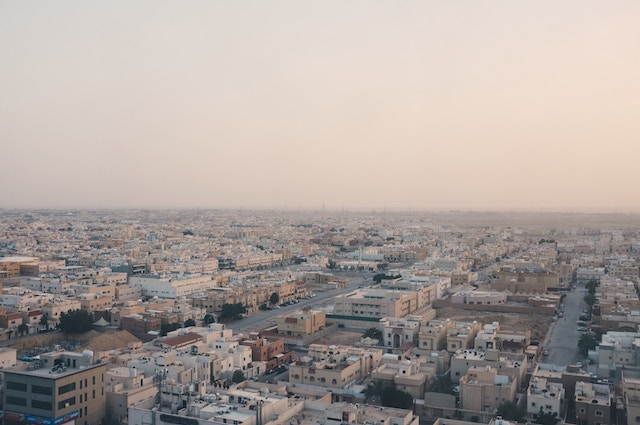
When you’re an outsider in Riyadh Saudi Arabia, you notice three things immediately:
- It is really hard to find your friends and colleagues when they’re all wearing the abaya.
- The sad shrivelly little things you were always told are dates are nowhere near as good as fresh ones.
- Everyone is really, really welcoming.
As someone who has travelled in the Middle East before, I was used to big style hospitality, but nothing quite like this. A prospective student explained to me that this extreme hospitality comes from the “olden days.” The inhospitable climate of Saudi Arabia presented an interesting challenge to travelers.
In a nutshell: it was hot, it was hard, and it wasn’t very forgiving. When travelers arrived anywhere, even if it wasn’t their destination, they were able to ask for lodging and food for up to three days from anyone they saw. The tradition of welcoming travelers is long ingrained in the culture, and continues today.
Where I’m from it’s polite to bring flowers or wine to dinner or offer to show a lost tourist directions. But, I would never have thought to invite someone into my home whom I had just met.
We were shown hospitality in many ways. From our interpreter’s mom bringing an enormous plate of homemade kabsah just because I mentioned that I wanted to try it, to the countless genuine dinner invitations I received from Saudi families, we were welcomed with open arms. I was even the cause of a verbal fight in a shop when someone wanted to buy me an abaya so that I knew the Saudi people welcomed me and wanted me to know it.
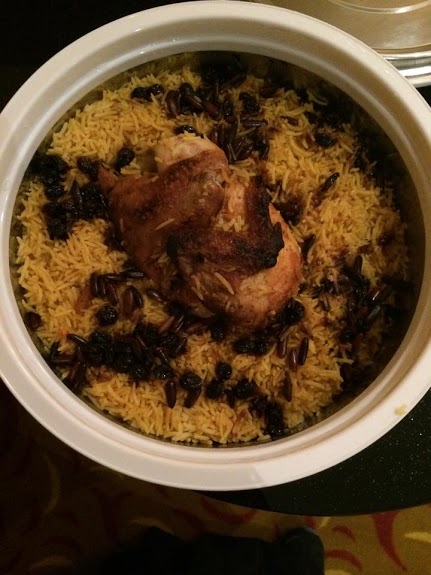
In Saudi Arabia the guest is king, or in my case, queen. And it is good to be queen. I felt so incredibly humbled by each of these invitations, because it was such a departure from the hospitality culture I grew up in. Where I’m from it’s polite to bring flowers or wine to dinner or offer to show a lost tourist directions.
But, I would never have thought to invite someone into my home whom I had just met. I even ended up going out to lunch with a colleague and prospective student (and sat in the male waiting area, good for me!) because he was shocked that the government had only given us visas long enough to work and go home. For him, it was not only sad, but unacceptable that we would go back to the UK without seeing what life was really like in Riyadh.
The best hospitality though came from the genuine kindness and non-judgmental attitude I found from so many people. We were different in some ways, but just the same in others. I think it is best summed up with this story:
At this moment, absolute panic set in that the driver would think I was either a. Jewish, which would have been okay, except for that it could mean I was… b. Israeli.
I was with a colleague in a taxi, with a cab driver who spoke approximately this much English: “Hello” “I love you” “Money” “Friends” “Good” “Whiskey” “People.” However, during our hour-long drive, we somehow managed to have a conversation. This impressed me 1. because my Arabic is garbage and 2. because I was shocked someone actually had the motivation to try when it was difficult and not very productive.
During a slight cultural and linguistic mishap, the following exchange occurred:
Colleague to driver: So, are you Muslim? (I probably wouldn’t have asked this of a stranger, but what can you do?)
Driver: Alhamdulillah (thanks be to God), wa anta? (and you?)
Colleague: Alhamdulilah, yes.
Driver to me: Wa anti?
Me: La (no), Christian. (I’m a pretty light Christian, but you take my point.)
An Outsider in Riyadh Saudi Arabia
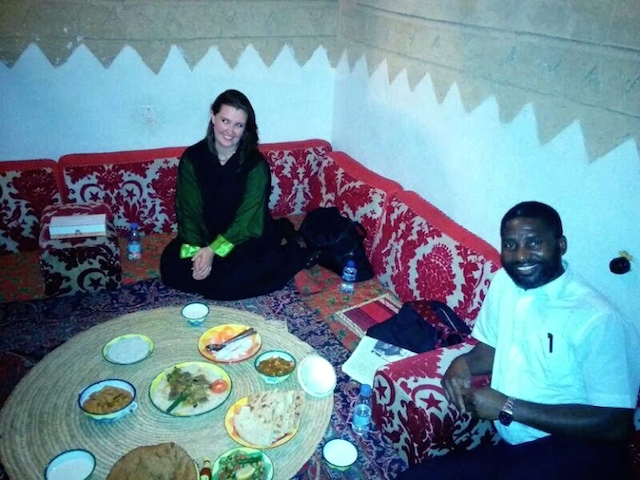
And this is where things got confusing. Christian is not a universal word, and I don’t know the Arabic term. I basically tried to explain, “You have Muhammed, I have Jesus,” but I did not get very far. My colleague tried to jump in to explain, and this happened:
Colleague: You know, Jerusalem, Jerusalem.
You know, Jerusalem, Jerusalem.
At this moment, absolute panic set in that the driver would think I was either a. Jewish, which would have been okay, except for that it could mean I was… b. Israeli.
For those of you who aren’t acquainted with the situation between Israel and Palestine, and what it means for the Middle East, I HIGHLY recommend watching “The Promise” on UK Channel 4. Read read the Wiki page. It is REALLY complicated.
I immediately thought: If this guy thinks I’m Israeli, I need to get out of this cab. If you have even been to Israel you aren’t allowed in the country, and I have no idea how political this man is.
Panic. Distress. Awkward stumbling for words to try to explain.
Driver: Torah? (the Jewish holy text)
Me: “Well n—”
Driver (interrupting me): Mish muskilah (no problem), good people!
Stunned silence.
So no, I didn’t openly offer information that I support gay marriage, or go around hugging strange men, but I felt comfortable being myself while in Saudi Arabia. That was the best hospitality I could have asked for.
If you only remember one thing, I hope you remember my awkward cab ride. It was a perfect demonstration of how total strangers who are “supposed to” act a certain way or believe a different thing took me on my own, and made a judgment on me as an individual person. Regardless of what I hear about a certain country, or a religion, or way of living, I hope I offer others the same courtesy.
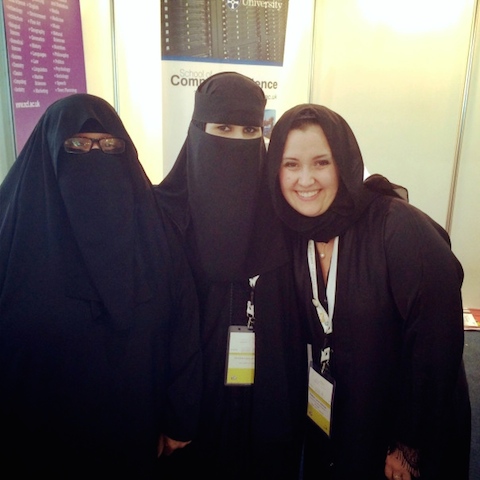
An Outsider in Riyadh Saudi Arabia
Related Reading
How to Be a Woman in Saudi Arabia: Abayas, Hijabs, and Segregation
Have you traveled to Riyadh, Saudi Arabia? How was you trip? Email us at [email protected] for information about sharing your experience and advice with the Pink Pangea community. We can’t wait to hear from you.
An Outsider in Riyadh Saudi Arabia photo credits: Liz Sherman and Unsplash.




